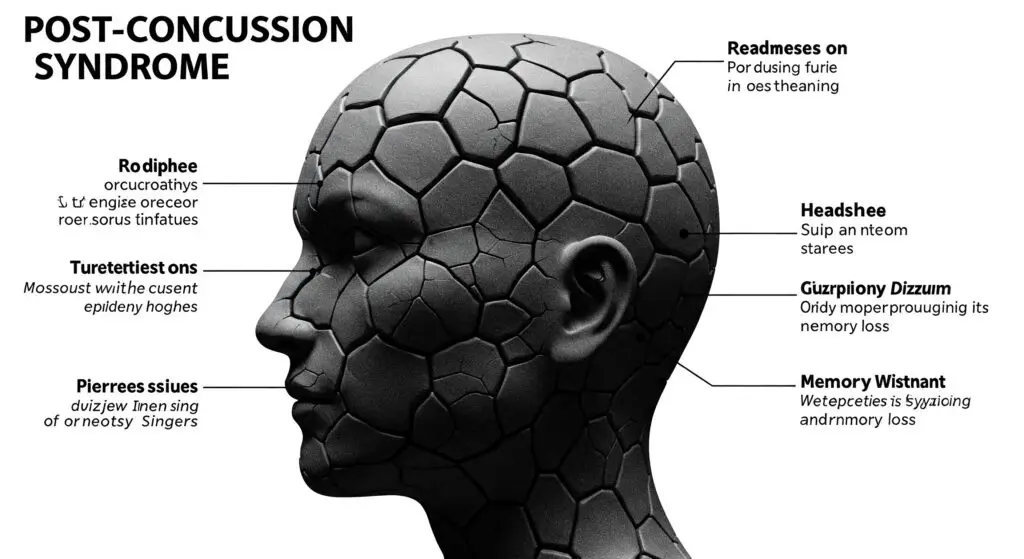
Every year, millions get concussions—basically your brain’s version of getting KO’d in a Marvel fight scene.
Most people recover fast.
But for some, the symptoms stick around like a Netflix show that won’t get canceled.
That’s Post-Concussion Syndrome (PCS).
So how long does it last? Why won’t it go away? And what can you actually do about it?
This guide breaks it all down—no medical jargon, just real talk, science-backed tips, and a few laughs to help you through the fog.
What Is Post-Concussion Syndrome (PCS)?
Post-Concussion Syndrome is what happens when your brain just doesn’t bounce back like it’s supposed to after a concussion.
Normally, symptoms fade within a few weeks—but with PCS, they hang around for 3 weeks, 3 months, or even longer.
Think of it like your brain’s trying to buffer… and it’s stuck at 15%.
Common PCS symptoms include:
- Headaches that just won’t quit
- Feeling dizzy or off-balance
- Major energy drops (hello, nap attacks)
- Mood swings or getting snappy for no reason
- Anxiety or feeling down
- Trouble sleeping
- Brain fog, aka focusing feels like wading through molasses
- Forgetting things you normally wouldn’t (like where you parked… again)
And here’s the kicker: you don’t need to have had a big, dramatic head injury to get PCS.
Even a mild bump—like a fall, sports hit, or fender bender—can set it off.
According to a 2017 study in The Lancet Neurology, around 10–30% of people who get a concussion end up with PCS.
So if your brain’s still acting weird long after the injury, you’re definitely not alone.

How Long Does Post-Concussion Syndrome Last?
There’s no one-size-fits-all answer here.
For most people, PCS clears up in 3 to 6 months.
But for others, the symptoms can stick around like a bad reboot—dragging on for a year or more.
What Affects Recovery Time?
Think of PCS like a tricky video game—how fast you “level up” depends on a few key factors:
- Age: The older you are, the longer your brain might take to bounce back. (Sorry, boomers.)
- Gender: Women tend to experience longer-lasting symptoms. Scientists aren’t totally sure why, but hormones might play a role.
- Previous concussions: More concussions = more chances for PCS to stick around. It’s like your brain has less buffer room.
- Mental health history: Already dealing with anxiety, depression, or PTSD? Your brain might need extra time and support to recover.
- How you handle it early on: Getting the right help early can speed things up. Ignoring it? That’s like driving on a flat tire.
And here’s a plot twist from JAMA Pediatrics: Teens who parked themselves on the couch and rested too much after a concussion actually took longer to recover than those who slowly got back to daily life. So rest is good—but not forever.
Symptoms Timeline: What to Expect
Here’s a rough timeline based on typical PCS recovery patterns:
|
Time Post-Concussion
|
Common Symptoms | Notes |
| 0–3 Weeks | Headache, fatigue, light sensitivity |
Considered normal post-concussion symptoms.
|
| 1–3 Months | Cognitive issues, mood changes |
PCS diagnosis often made here.
|
| 3–6 Months | Emotional symptoms, sleep problems |
Symptoms may start to fade.
|
| 6–12 Months | Intermittent cognitive or emotional symptoms |
Persistent PCS likely.
|
| 12+ Months | Chronic symptoms |
Requires comprehensive neurological review.
|
Diagnosing PCS: Why It’s So Tricky
Figuring out if someone has Post-Concussion Syndrome isn’t as simple as running a test and getting a clear answer.
It’s more like detective work—minus the cool trench coat.
Here’s why diagnosing PCS can be complicated:
- No single test can prove it. There’s no magic blood test or brain scan that says, “Yep, you’ve got PCS.”
- The symptoms look like other stuff. Fatigue, brain fog, mood swings? Those could be PCS—or stress, anxiety, or even burnout. It’s like your brain’s playing symptom charades.
- Scans usually come back normal. MRIs and CTs often look totally fine, even when your brain feels like scrambled eggs. It’s frustrating but common.
So how do doctors figure it out? They piece things together based on:
- Your story (what happened, how you’re feeling)
- Your symptoms (when they started, how long they’ve lasted)
- Sometimes neuropsych tests (think: brain puzzles that measure memory, attention, and mood)

Treatment Options: What Actually Helps with PCS?
There’s no magic pill for Post-Concussion Syndrome (sadly, no Wakandan tech yet).
But the best results come from a team effort—treating both the brain and the body.
Here’s what works:
Cognitive Behavioral Therapy (CBT)
Feeling anxious, moody, or just not you?
CBT is like mental gym for your thoughts.
It helps you tackle stress, anxiety, and depression—super common in PCS.
The American Psychological Association backs it big time.
Basically, it rewires your brain’s inner dialogue, Jedi-style.
Vestibular therapy
Still feeling wobbly or dizzy like you just got off a roller coaster?
Vestibular therapy helps retrain your balance system.
One study in The Journal of Head Trauma Rehabilitation showed it really speeds up recovery.
Think of it as “physical therapy for your inner ear.”
Medications
Doctors may bring in meds for backup—to handle:
- Headaches that won’t quit
- Trouble sleeping
- Anxiety or depression
Just remember: meds help the symptoms, not the root cause.
They’re part of the squad, not the superhero.
Gradual return to activity
Old advice said “rest and do nothing.” New science says: rest, then slowly get moving.
A little activity (with doctor approval) actually helps the brain heal.
Total bed-rest after the first 48 hours?
That’s now considered outdated—like flip phones.
How to Speed Up Recovery: Real-Life Hacks
- Stick to a routine – Your brain loves structure. Think of it like setting a daily rhythm on Spotify.
- Cut screen time – Especially early on. Your brain needs chill time, not TikTok marathons.
- Skip the booze – Alcohol and brain healing? Not a good combo.
- Eat smart – Load up on brain food: omega-3s (like salmon), B vitamins, and colorful fruits/veggies.
- Stay social – Don’t ghost your friends. Isolation can make everything feel worse.
When to Seek a Specialist
If your PCS symptoms are still hanging around after 3 months—or they’re getting worse instead of better—it’s time to bring in the pros.
You wouldn’t ignore a car engine that keeps stalling, right? Same goes for your brain.
Here’s who you might need on your all-star recovery team:
- Neurologist – the brain’s main mechanic
- Neuropsychologist – the expert in how your brain thinks, feels, and remembers
- Concussion specialist – someone who lives and breathes post-concussion care
Long-lasting PCS often needs more than just one doc.
Coordinated care (aka everyone working together) gives you the best shot at feeling like yourself again.

PCS and Mental Health: The Hidden Challenge
The emotional side of PCS can be the sneakiest villain.
Brain fog and dizziness are rough—but anxiety, depression, or sudden mood swings?
Those hit hard and often get overlooked.
Studies show up to 80% of people with PCS deal with mental health struggles (Leddy et al., 2016).
That’s not just a footnote—it’s a major part of the story.
Mental health care isn’t a “nice to have”—it’s a must.
Therapy, counseling, or even just talking to someone who gets it can seriously speed up your recovery.
Think of it like emotional first aid for your brain.
The Bottom Line: Patience is Key
Post-Concussion Syndrome can stick around for a few months—or even longer—but most people do bounce back with the right care.
The trick?
Think long game, not quick fix.
This isn’t a montage moment where recovery happens in 90 seconds with upbeat music.
Here’s what really helps:
- Be patient – Healing takes time. Your brain’s not broken—it’s just on a slow reboot.
- Get help early – The sooner you team up with pros, the smoother your path gets.
- Stay curious – Learn what works for you. Be your own recovery detective.
- Don’t expect a straight line – Recovery has ups, downs, and plot twists. That’s normal.
PCS isn’t the end of your story—it’s just a frustrating chapter.
And like any good series, with support and persistence, things do get better.



